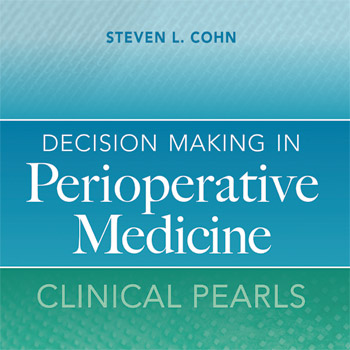New resource offers pearls for perioperative medicine
A recent book addresses perioperative medicine, including how to be a perioperative consultant, prophylaxis for venous thromboembolism, coexisting medical problems, and common postoperative complications.
Physicians managing patients before and after surgery face multiple decisions, including when to start and stop medications and how to determine a procedure's cardiac risk. In “Decision Making in Perioperative Medicine: Clinical Pearls,” published in 2021 by ACP in partnership with McGraw-Hill, editor Steven L. Cohn, MD, MACP, aimed to organize the process.
“We included a lot of tables and at least one algorithm in every chapter,” he said. “It's not as wordy as a textbook would be. … It's more of what you need to know and how to go about doing it. What are the risk factors, and how do I proceed in terms of my evaluation? It's a hands-on type of book.”

ACP Internist recently spoke to Dr. Cohn, who is a professor emeritus in the department of medicine at the University of Miami Miller School of Medicine and a senior fellow in the Society of Hospital Medicine, about the basics of perioperative medicine and how his book can help clinicians navigate them.
Q: Perioperative medicine is a big field. How did you focus the discussion?
A: Regarding authors, I wanted people who did this as their main job. They were either directors or division chiefs of perioperative medicine, preop clinics, or medical consultation services in an academic setting. They've been involved with perioperative medicine for a long time.
The book covers what we consider the core topics, divided into four sections. The general section in the beginning covers how to be a perioperative consultant, preop testing, managing medications, and a little bit about anesthesia. Then there's a section on prophylaxis for venous thromboembolism, surgical-site infection, and endocarditis. The main section, which is the core of the book, discusses coexisting medical problems: How do we evaluate them? What are the risk factors? How do we medically optimize them?
The last section briefly covers some of the more common postoperative complications. You could write a whole book just on postop complications, but their management is similar to what general internists or hospitalists would normally see. When you're managing a patient, the big difference is really the preop evaluation and perioperative management. If somebody gets a deep venous thrombosis or pulmonary embolism postop, it's the same basic management, although you need to consider bleeding risks after surgery. If a surgical patient gets pneumonia, management is also similar to that in a medical patient. But if somebody comes in before surgery with chronic obstructive pulmonary disease or with heart disease, the question is, what are their risks for surgery? We know how to manage the condition medically, but is there anything different that we should do for surgery? That's the main focus of this book.
Q: Which chapters do you think will be most helpful to readers?
A: The cardiac risk chapters, because that's what everybody's worried about, that the patient is going to have a heart attack and die. The chapters on perioperative medication management and anticoagulation are also hot topics because everybody's on some medication, and you need to know what to do with it before surgery.
Q: What areas of perioperative medication management are the most challenging right now?
A: I wouldn't say that it's that controversial, but there's a lot of mismanagement and misunderstanding in anticoagulation, and that's why there's a separate chapter on that. Direct oral anticoagulants that have come on the market in the last 10 years are frequently mismanaged perioperatively; people don't know what to do with them, and they don't understand the pharmacology. Also challenging are angiotensin-converting enzyme inhibitors and angiotensin-II receptor blockers, whether they should be stopped or not. The other category that's controversial is stress-dose steroids: when they're indicated or not, or who gets them. There's really no good clinical trial evidence for or against it.
Q: Is there anything in the book overall that represents a big change from previous teaching?
A: It's more of an update about things that have evolved over the years. The main topic that changes is cardiology, because that's where most of the studies are done. Other recent studies are also focusing on cognitive dysfunction and frailty in geriatric patients, and ways to enhance recovery and rehabilitation—how to get patients, especially the sickest patients, ready for surgery. Those are the things that are new, or newer.
Q: You put this book together during the first stages of the pandemic, and you mention in the preface that you deliberately chose not to cover COVID-19. Was that a difficult decision?
A: It was. As much as it was a hot topic, we could have written almost anything we wanted, because nobody knew anything at the time. As things evolved, recommendations were being made mainly related to COVID testing and what should be done before allowing a patient to enter the hospital for surgery. None of it really involved other preoperative evaluation.
What I would have liked to write about was preoperative evaluation of people who had COVID and recovered, and now have to undergo surgery. Should we be doing anything differently? Should we order tests that we wouldn't normally order? Should we get a chest X-ray on somebody who's asymptomatic, just because they were in the hospital and had COVID with pneumonia? What if they were in the ICU?
But nobody knew what the answer was. … We had absolutely no information, and what we did have was usually from a single center, and we didn't know if it would pertain to everyone. I decided, since information about COVID-19 was evolving so quickly, and we didn't really know much related to perioperative risk evaluation after COVID, to not say anything at all.
Q: Is there one particular question you're asked most often about perioperative care?
A: I don't think I can pick one other than, “Is the patient going to be OK?” What I say in my first chapter on the role of the consultant is that we're not a clearinghouse. The typical consult question is usually, “Is the patient cleared for surgery?,” and that's not the language we should use, because it implies a guarantee that they're going to be OK. We never know for sure if any patient will have a complication, and I always told my residents, “I do not want to see the word ‘cleared’ anywhere in your notes. If another physician wants to say it, let them say it, but you're not going to say it with my signature on it. We medically optimize patients for surgery but do not ‘clear’ anyone.”
Q: What else do you think readers should know about the book?
A: At least in the past, a lot of internists and hospitalists have commented that they were inadequately trained in this area during residency. A lot of programs do not have a special rotation to do perioperative medical consultation, and if they do, it may be as little as one week or, if they're good, they have a four-week rotation. I think the information in this book will be helpful to them in trying to evaluate patients when they have to do it on their own in clinic or in private practice. … This book is geared primarily to the medical audience—hospitalists, internists, medical residents, PAs, ARNPs—although it will also be useful for anesthesiologists and surgeons.




